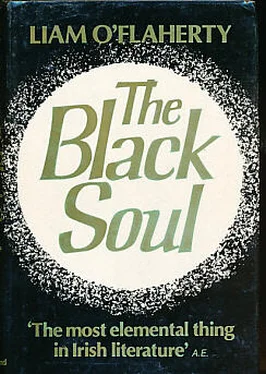He had fallen against the door of Red John’s cabin. He was unconscious when Little Mary threw herself on his neck. Folly, folly, folly, what is folly?
2
At Rooruck winter sleeps in its depths. But it’s a troubled sleep, sad, weary, and full of nightmares. It is the sleep of a wanton who is hiding from the wreckage she has caused.
After a month of storm and fury, the sea lay frothing about the Hill of Fate, licking its grey base as a lion licks his wounds. It stretched out for leagues white with foam, coloured here and there with wreckage and masses of straying seaweed, with planks, weeds, and dead bodies of birds. Strewn amid the rocks to the north, along the shore at Rooruck, where the cliff fell away into a long uneven battlement of huge boulders, there was more wreckage. It was said that three mangled corpses were seen tangled among the rocks at Firbolg’s Point. Sean Mor, who saw them, fled in fear, and when the villagers came they were washed away again by the tide. Farther north again, just south of the point where the waters of the north and south joined to travel eastwards, where the swift current seemed to suck the waves downwards to some cavern in the depths, three horses lay on a rock, lying on their sides, their stiff legs extended hairlessly, their bellies expanded, their nostrils full of sand.
The people feared the resting bilious sea as a soldier fears the silence of the guns in an interval between two engagements. When it raged, churned by the wind, it showed its might, but now the huge claws of its breakers were hidden in its frothing back. And they might shoot forth any moment. The sea might rise suddenly far away to the west and come towering in, each forked wave-crest a magnet that drew the sea before it into its hollow breast, until the Giants’ Reef lay bared for a mile and the slimy insects clinging to its back stared gasping at the awe-inspiring sky, before the retreating sea again enveloped them in accustomed darkness. For the battle is not as fearsome as the waiting for it, nor is the sword as terrible as the fire in the eye that guides it. So the peasants feared the sea, and fearing it blessed it as their generous mother, who wrecked ships afar off to give them planks and barrels of oil and manila ropes and bales of cotton. They prowled about the shores and among the boulders beneath the Hill of Fate looking for wreckage.
By day the sun shone fitfully on Rooruck, coming laggardly over the high cliff of Coillnamhan Fort. Its shadows glistened through the mist and through the clouds that pursued it. By night the hoar-frost covered the earth, eating into the gashes that the wind had made. Wild starry nights were those nights in Inverara. Boys sat by their windows, shivering in their shirts, afraid to sleep because of the strange noises of falling seas that came from the Fountain Hole, where the mermaids were said to weep for lost lovers as they combed their long golden hair, dipping the combs in the black brine that dripped from the roof of their cave into the Purple Pool beneath. Wild starry nights, when men dream of death and stillness, as they watch the shivering moon fleeing through the scratched sky. Death, death, death, and drear winds blowing around frozen dead hearts, that once throbbed with love. Inverara in winter is the island of death, the island of defeated peoples, come thither through the ages over the sea pursued by their enemies. Their children sit on the cliffs dreaming of the past of their fathers, dreaming of the sea, the wind, the moon, the stars, the scattered remnants of an army, the remains of a feast eaten by dogs, the shattering of a maniac’s ambition.
The Stranger, lying on his bed in Red John’s cabin, was near to death. He had fallen into Little Mary’s arms when she opened the door, roused by the noise of his fall against it.
‘Ah, Mother of Christ,’ she gasped once, seeing his white face with the hair streaming over it, soddened by the rain, as if he were dead. She thought he was dead. She raised him in her strong arms like a child and ran with him to his room, panting. Throwing him on the bed she ran her hands wildly over his body, searching for life in him. And then when she felt his heart beating she raised her hands to heaven and thanked God and wept with joy. She put him to bed and chafed his limbs with turpentine. Then she rolled the blankets about him and sat with her arm under his head, watching until he should regain consciousness.
Dawn had just broken. Red John got up and came into the kitchen in his bare feet.
‘Where is that – ‘ he began when he saw his wife through the open door of the Stranger’s room, her arms around the Stranger’s neck, her cheek to his lips. His small eyes narrowed and he clenched his hands. He moved stealthily to the door and looking in grinned viciously. ‘Ha, now I have you, adulteress,’ he hissed. But when she looked up at him he crept back terrified. There was no fear or shame or anger in her look. There was a sadness in her eyes, a distant look of sadness, as if she were no longer conscious of her relationship with him as a wife, as if his memory had died and been forgotten in her fear for her lover who was ill.
Red John shut the door and held on to the latch with his two hands to keep away from the look in her eyes. His superstitious mind thought she had gone mad or had been ‘taken by the fairies,’ just as Sarah Halloran had some years before. A sea-serpent had leered at her as she was washing bags in a pool beneath the Hill of Fate, and ever afterwards she sat there all day watching the spot where the serpent disappeared, until one day, tearing her hair, she threw herself headlong from the cliff. So they believed in Rooruck, for who could not believe in magic by that drear sea in winter, listening to its moaning at night?
Red John ran to the hearth as he heard his wife come to the door.
‘Get the doctor, Red John,’ she said.
Her voice was as gentle as the voice of a mother talking to her first-born. It was the first time he had heard her speak gently to him since they were married. Then she went back again to the Stranger without waiting for his reply. She felt a power within her that would make an army obey her command.
Red John stood by the hearth in his shirt, barefooted, scratching his thigh. He was struggling with two impulses, fear and jealousy: fear of the look he had seen in her eyes, and mad jealousy of her sitting with her arms around the Stranger’s neck and her cheek to his lips.
‘Let the bastard die,’ he mumbled.
But again the memory of Sarah Halloran came to his mind and the ghost he himself had seen at the Monks’ Well coming one night from Kilmurrage. He sat by the fire hugging his armpits, and became so much afraid of his wife being enchanted that he was unable to do anything. He didn’t even hear her come rushing at him from the room until her hand was entwined in his hair and she hissed in his ear:
‘Get the doctor quickly, or I will brain you.’
‘Don’t strike, woman,’ he whined. ‘I’m going.’
She watched while he dressed and left the cabin to get his pony. Soon he was riding down the rocky boreen through the village on to the road to Kilmurrage, waving the ends of the halter around his head and yelling to the mare like a madman. Little Mary stood at the door listening to the dying rattle of the horse’s hoofs and she shuddered.
‘Oh, cruel God, don’t take him from me,’ she cried, clasping her throat.
The sound of racing hoofs suggested to her her lover’s death. That sound is the harbinger of death in Inverara in winter, heard at dawn or in the dead of night, when the sea is always devouring some one or shattering their limbs, and horses gallop in haste into Kilmurrage with froth on their flanks, hurrying for the doctor and the priest. Women rush to their windows in their shifts and whisper, ‘Lord between us and all harm, who is it has been drowned or who is hurt?’
Читать дальше












